Business Mission to Zambia – The Real Africa
MASSA and MIDA organized a mission to Zambia from March 7-12, 2007 as a follow-up to the Cross Border Investment Seminar on Zambia held in Kuala Lumpur. 17 participants from 11 organizations took part in the mission that covered Lusaka and Livingstone and was led by Tan Sri Dato’ Soong Siew Hoong, a member of MASSA’s Executive Committee. Dato’ J Jegathesan and his staff, together with JICA Zambia, coordinated and facilitated the mission.
The mission members had a tight programme. A seminar on ‘Doing Business with Zambia’ was held in Lusaka, concluding with individual business meetings among the Malaysian delegation and Zambian business people. Zambian Minister of Commerce, Trade and Industry, Hon. Kenneth Konga addressed the seminar, and highlighted the advantages of investing in Zambia, particularly as Zambia focused on private-sector led growth. The Zambian Government has instituted macro economic policies that are targeted at establishing an environment for increased domestic industrial growth, export promotion, development of market oriented production management and private sector development. Economic reforms include:
- Abolition of price controls
- Removal of exchange rate and bank interest rate controls
- Abolition of foreign currency controls in total
- 100% repatriation of net profits
- Privatization of state-owned enterprises
- Promotion and facilitation of both local and foreign direct investment
- Promotion of exports
- Development of the capital market through the Lusaka Stock Exchange
- Measures to diversify the economy from the traditional (copper and cobalt production) to non-traditional production and exports have been put in place
- Zambia has successfully reached the completion point of the Heavily Indebted Poor Countries (HIPC) Initiative and therefore have begun to benefit from bilateral and multilateral institutions. This augurs well and will put Zambia on track for development aid.
The policies and reforms had borne fruit in that Zambia had recorded an average economic growth of 5% and reduced rates of inflation and interest for the past three years. Foreign direct investment inflows into Zambia increased from US$72 million in 2001 to US$259 million in 2005, representing a 200% increase, showing that the country has a favorable investment climate.

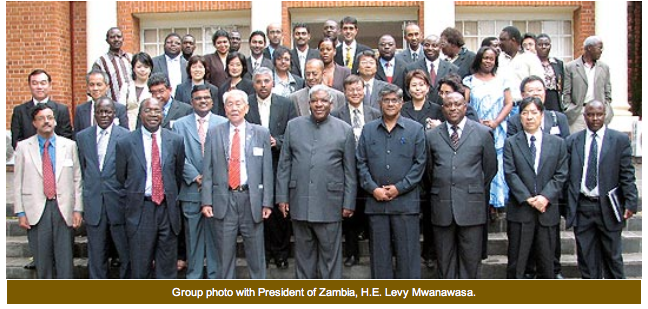
The mission members called upon the President of Zambia, H.E. Levy Mwanawasa, Minister of Commerce, Trade and Industry, Hon. Kenneth Konga and the Minister of Finance and National Planning, Hon. Ng’andu Peter Magande. In his speech, H.E. President of Zambia welcomed the Malaysian delegation, which was the first Malaysian Business delegation to Zambia and encouraged the setting up of Malaysian businesses in Zambia. Two Malaysian-Zambian joint venture projects were announced to the President, i.e. manufacturing of mobile phones and the setting up of a technical college in Zambia.
The Malaysian delegation was welcomed by the Mayor of Livingstone on arrival at the Livingstone Airport, and thereafter was taken to visit several potential sites for tourism development. The delegation was also treated to a leisurely two-hour sunset cruise on the Zambezi River on board the African Queen where delegates witnessed a spectacular sunset. The evening was concluded with a dinner hosted by the Livingstone business community at the Boma, an outdoor village-themed dining where a cultural performance was featured for the guests’ enjoyment.
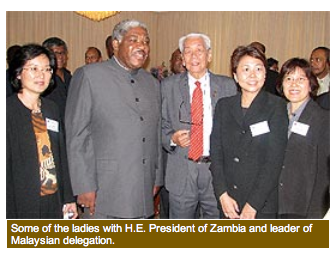 Zambia is one of the most liberalized economies in Africa with a decontrolled foreign exchange market, retention by investors of 100% profits and no controls on prices, production and dividend payments. The country, endowed with rich natural resources, is one of the most peaceful and stable countries in Africa with a low sovereign risk. As a member of both the Common Market For Eastern and Southern Africa (COMESA), and South Africa Development Community (SADC) regional economic trading blocks, Zambia is well positioned to take advantage of an easily accessible 450 million population market.
Zambia is one of the most liberalized economies in Africa with a decontrolled foreign exchange market, retention by investors of 100% profits and no controls on prices, production and dividend payments. The country, endowed with rich natural resources, is one of the most peaceful and stable countries in Africa with a low sovereign risk. As a member of both the Common Market For Eastern and Southern Africa (COMESA), and South Africa Development Community (SADC) regional economic trading blocks, Zambia is well positioned to take advantage of an easily accessible 450 million population market.
Zambian Key Macroeconomic Indicators
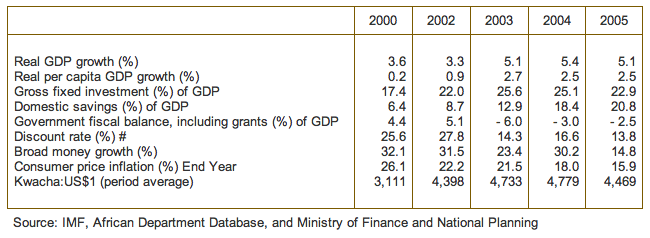
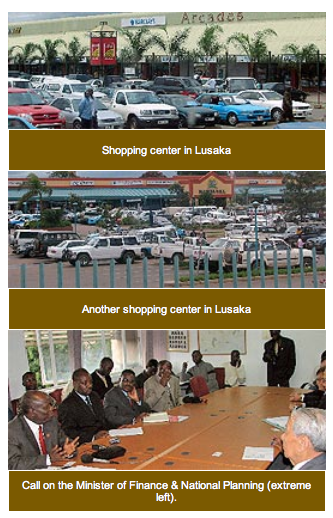 Priority sectors for investments include agriculture, tourism, mining, manufacturing and energy. Two-thirds of Zambia has medium to high potential for agriculture production, with only 15% currently under cultivation with maize, wheat, groundnuts, sugar cane, coffee, cotton, tobacco fresh vegetables and flowers. The country is well supplied with rivers and lakes, having 45% of southern Africa’s water resources. There is also great potential for aquaculture.
Priority sectors for investments include agriculture, tourism, mining, manufacturing and energy. Two-thirds of Zambia has medium to high potential for agriculture production, with only 15% currently under cultivation with maize, wheat, groundnuts, sugar cane, coffee, cotton, tobacco fresh vegetables and flowers. The country is well supplied with rivers and lakes, having 45% of southern Africa’s water resources. There is also great potential for aquaculture.
Mining in Zambia are mainly for copper and cobalt as there are huge reserves of these two minerals in Zambia. Zambia also has a variety of precious and semi-precious gemstones of which emeralds account for 20% of the world’s supply. There are also coal, feldspar, marble, silica, fluorite, graphite, tantalite, lime, gold and silver.
Zambia has abundant energy resources particularly hydropower. The industry and manufacturing sector in Zambia is driven by agro-processing, textiles and leather subsectors. Other activities include smelting and refining of copper and other metal products, production of fertilizers, chemicals, construction materials and cement. The Zambian Government has identified textile, wood processing, metal and engineering works and vehicle assembly as key subsectors for manufacturing.
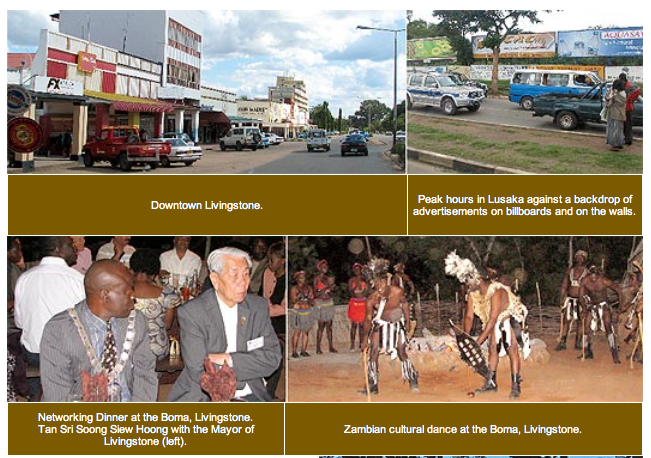
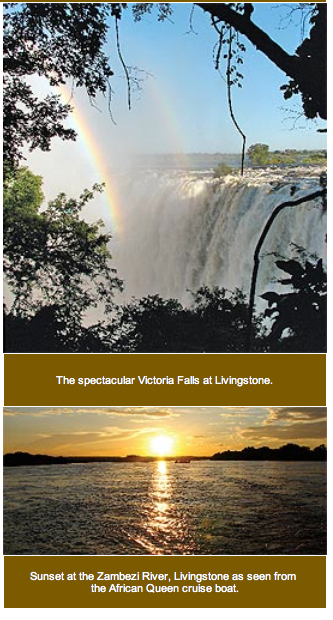 Zambia has a lot to offer in the tourism sector, with 34 game parks and 19 game management parks, of which only a few are developed. Investors are invited to exploit the country’s vast game reserves, stunning scenery and rich cultural heritage. In 2004, Zambia was named one of the top 10 world tourist destinations by the British Trends and Spends Survey while South Africa and Zambia were rated the top two tourist destinations in Africa. Known as the “Land of Magnificent Waterfalls”, Zambia shares the famous Victoria Falls with neighboring Zimbabwe, and is one of the seven natural wonders of the world. The Falls is fed by the mighty Zambezi River, and has created an adrenaline-pumping playground for world class white water rafting, river boarding, kayaking, gorge swinging and abseiling.
Zambia has a lot to offer in the tourism sector, with 34 game parks and 19 game management parks, of which only a few are developed. Investors are invited to exploit the country’s vast game reserves, stunning scenery and rich cultural heritage. In 2004, Zambia was named one of the top 10 world tourist destinations by the British Trends and Spends Survey while South Africa and Zambia were rated the top two tourist destinations in Africa. Known as the “Land of Magnificent Waterfalls”, Zambia shares the famous Victoria Falls with neighboring Zimbabwe, and is one of the seven natural wonders of the world. The Falls is fed by the mighty Zambezi River, and has created an adrenaline-pumping playground for world class white water rafting, river boarding, kayaking, gorge swinging and abseiling.
Zambian businessmen have expressed interest to establish collaboration in the following areas:
- Agriculture Ð cultivation of crops and subsequent value adding processes, post harvest
- Food processing
- Furniture manufacturing, furniture component manufacturing
- Logistics Ð transport vehicles
- Housing development
- Tourism facilities in Livingstone
MASSA will be the focal point to coordinate enquiries from Zambia and carry out post mission follow-up activities.
Useful websites:
Zambia Development Agency (ZDA) www.luse.co.zm
Zambia Association of Chambers of Commerce & Industry (ZACCI) www.zacci.org.zm
Zambia Association of Manufacturers (ZAM) odonnell@zamnet.zm
